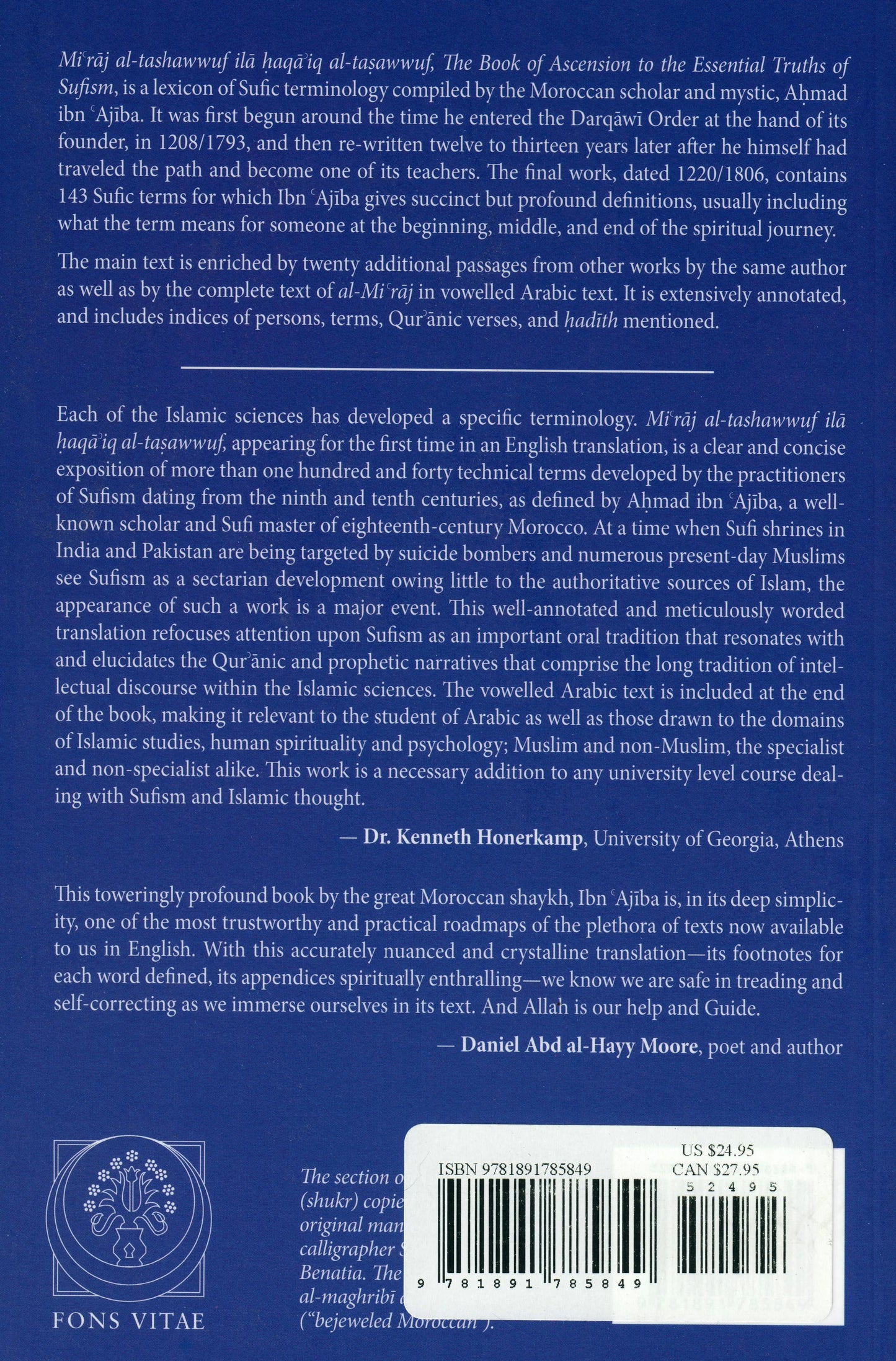About The Book
The Book of Ascension to the Essential Truths of Sufism is a lexicon of Sufic terminology compiled by the Moroccan scholar and mystic, Aḥmad ibn 'Ajiba. It was first begun around the time he entered the Darqawi Order at the hand of its founder, in 1208/1793, and then re-written twelve to thirteen years later after he himself had traveled the Path and became one of its teachers.
The final work, dated 1220/1806 contains 143 Sufic terms for which Ibn 'Ajiba gives succinct but profound definitions, usually including what the term means for someone at the beginning, middle, and end of the spiritual journey.
The main text is enriched by twenty more passages from other works by the same author as well as by the complete text of al-Mirʿaj in vowelled Arabic text, extensive notes, and indices of persons, terms, Qur’anic verses, and ḥadith mentioned.
Each of the Islamic sciences has developed a specific terminology. The Book of Ascension to the Essential Truths of Sufism, appearing for the first time in an English translation, is a clear concise exposition of more than one hundred and forty technical terms developed by the practitioners of Sufism dating from the ninth and tenth centuries as defined by Ahmad Ibn 'Ajiba, a well-known scholar and Sufi master of eighteenth-century Morocco.
At a time when Sufi shrines in India and Pakistan are being targeted by suicide bombers and numerous present-day Muslims see Sufism as a sectarian development owing little to the authoritative sources of Islam the appearance of such a work is a major event.
This well-annotated and meticulously worded translation refocuses attention upon Sufism as an important oral tradition that resonates with and elucidates the Qur'anic and prophetic narratives that comprise the long tradition of intellectual discourse within the Islam sciences.
The vowelled Arabic text is included at the end of the book making it relevant to the student of Arabic as well as those drawn to the domains of Islamic studies, human spirituality and psychology; Muslim and non-Muslim, the specialist and non-specialist alike.
This work is a necessary addition to any university-level course dealing with Sufism and Islamic thought.
— Dr. Kenneth Honerkamp, University of Georgia, Athens
This toweringly profound book by the great Moroccan Shaykh known as Ibn Ajiba is in its deep simplicity one of the most trusty and practical roadmaps of the plethora now available to us in English.
With this accurately nuanced and crystalline translation - its footnotes for each word defined, its appendices spiritually enthralling (with ecstatic undercurrents)- we know we are safe in treading and self-correcting as we immerse ourselves in its text. And Allah is our Help and Guide.
— Daniel Abdal-Hayy Moore, poet and author
Since Ibn ‘Ajiba was not the first one to be writing a glossary of essential Sufi terms, he benefitted immensely from the wisdom and experience of his notable predecessors while adding his own in producing this useful work. Hence, this is more than a lexicon; it is accumulated wisdom from the reservoir of experiences; it provides a nuanced understanding of the terminology essential for mapping one’s journey toward God-realization.
The present translation - the first in English - is completed by two practitioners and scholars who not only are adept in navigating the path of piety; they are also highly knowledgeable of Moroccan Islam and culture. M. F. Aresmouk and M. A. Fitzgerald - whose command of the languages involved in this work is evident from their lucid translation - have produced a scholarly work that is at once accessible and innovative. It will be useful to an advanced seeker and gripping for a novice.
The book includes a helpful introduction that contextualizes the work, the author and his motivations, and the historical background necessary for a better understanding of Sufism.
It will be indispensable in courses on Islam and comparative mysticism, and a “must-read” for those interested in Sufism and/or Islam in the Maghreb.
- Irfan A. Omar, Ph.D. Associate Professor of Islam and World Religions
Marquette University
About Author:
Ahmad ibn 'Ajiba (1747–1809) was an 18th-century Moroccan saint in the Darqawa Sufi Sunni Islamic lineage.
He was born of a sharif family in the Anjra tribe that ranges from Tangiers to Tetuan along the Mediterranean coast of Morocco. As a child he developed a love of knowledge, memorizing the Qur'an and studying subjects ranging from Classical Arabic grammar, religious ethics, poetry, Qur'anic recitation, and tafsir. When he reached the age of eighteen he left home and undertook the study of exoteric knowledge in Qasr al-Kabir under the supervision of Sidi Muhammad al-Susi al-Samlali. It was here that he was introduced to studies in the sciences, art, philosophy, law, and Qur'anic exegesis in depth. He went to Fes to study with Mohammed al-Tawudi ibn Suda, Bennani, and El-Warzazi and joined the new Darqawiyya in 1208 AH (1793), of which he was the representative in the northern part of the Jbala region. He spent his entire life in and around Tetuan and died of the plague in 1224 AH (1809). He is the author of around forty works and a Fahrasa which provides interesting information concerning the intellectual center that Tetuan had become by the beginning of the 19th century. Among his descendants are the famous Ghumari brothers.
About Translators:
Mohamed Fouad Aresmouk completed his degree in Islamic Studies and Arabic at Qadi Ayyad University in Marrakesh. He is the author of Al-Rashad Fi Zabdati Al-Awrad.
Michael Abdurrahman Fitzgerald has assisted in the research and annotation for a number of works and is the co-translator of The Invocation of God.
show more





